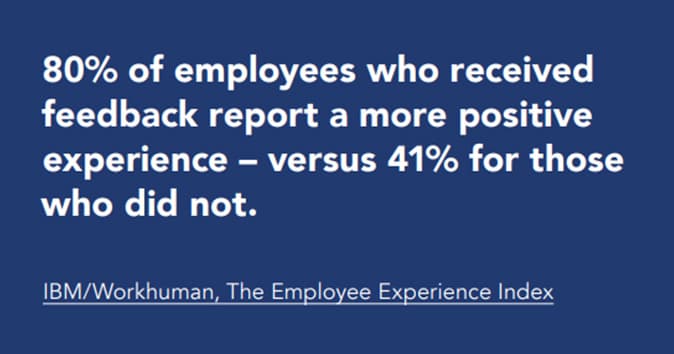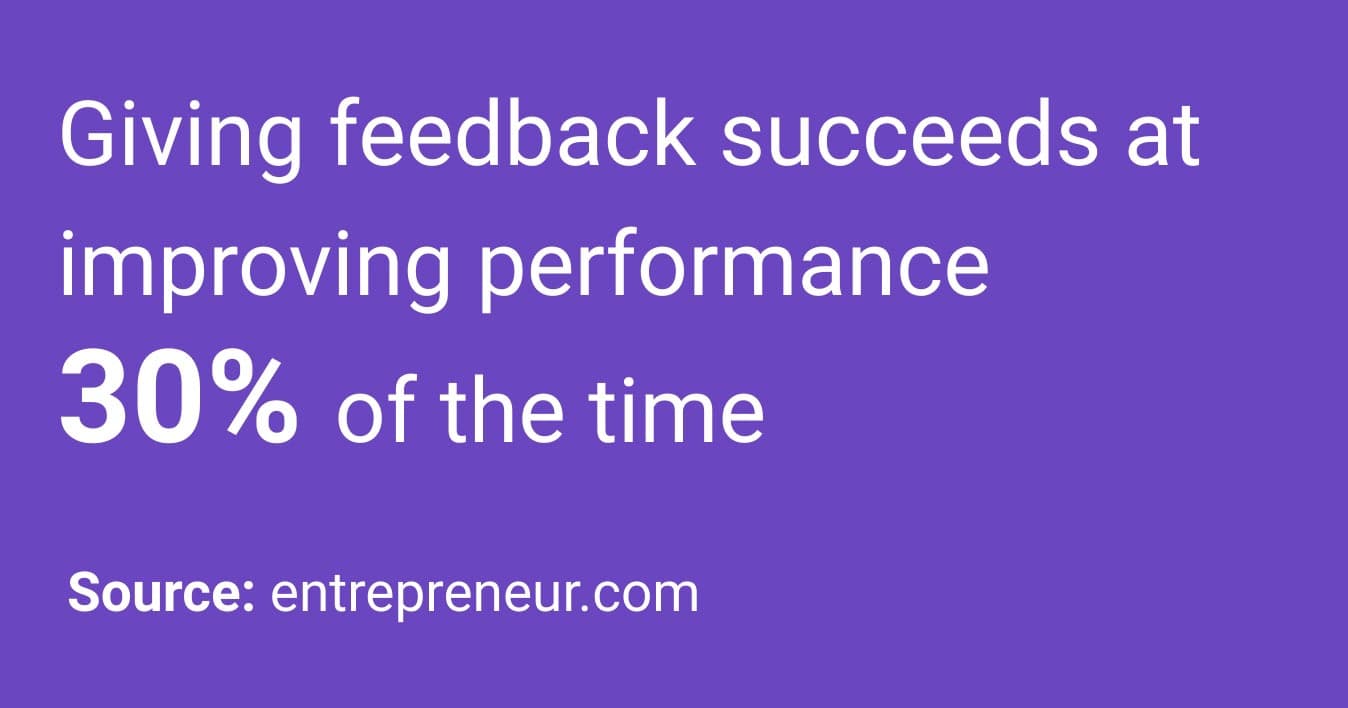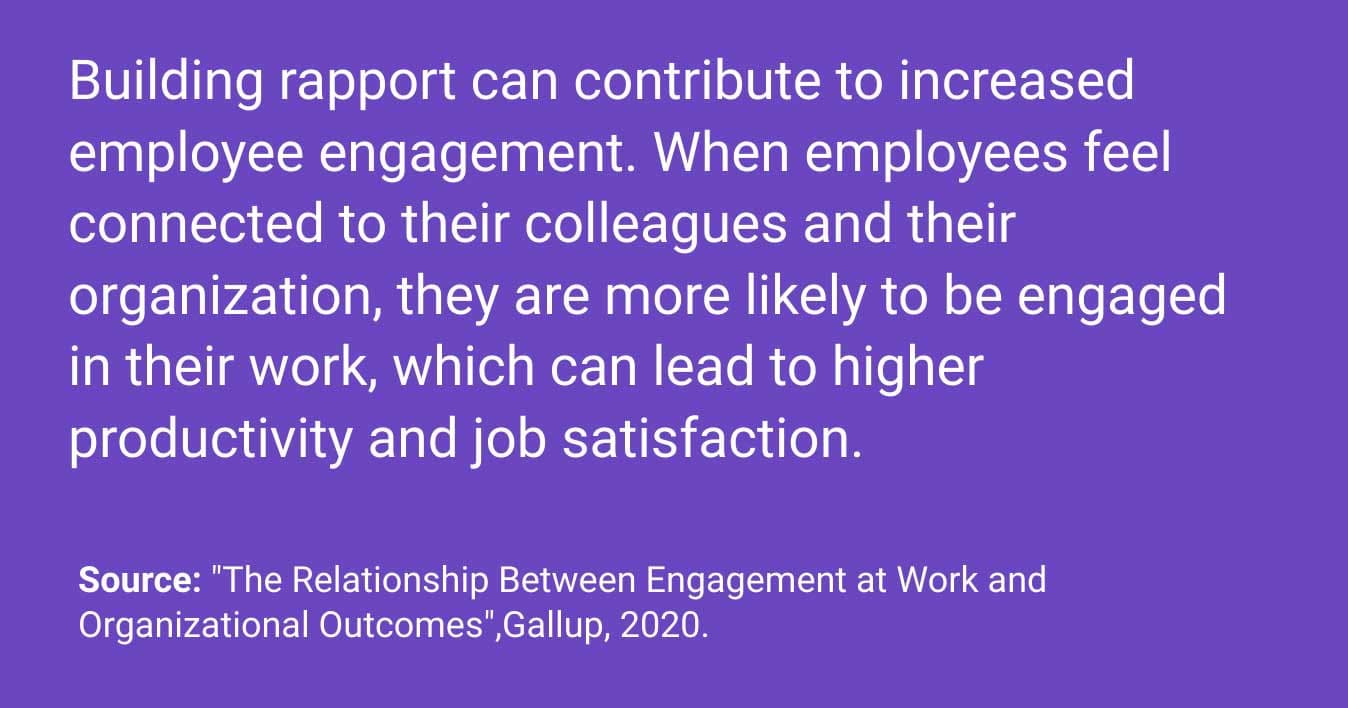Skip-Level Meeting Questions for Managers and Employees

A skip-level meeting is a one-on-one meeting between an employee and their manager's manager. The purpose of skip-level meetings is to give managers and employees the opportunity to engage in mutually beneficial interactions that align with the company’s goals, vision, and values.
The success of an effective skip-level meeting lies in the questions asked. By asking questions and feedback about performance, goals, and expectations, it ensures everyone is aligned with organizational objectives. It also helps identify areas of development and improvement.
Here are some great skip-level meeting questions that will spark insightful and productive feedback discussion. We suggest you use these questions as a starting point and personalize them for your specific relationship.
Let's get started.
Skip-level meeting questions to ask employees
Skip-level meetings give managers an insider look into team dynamics, performance, and concerns, and employees a chance to share their perspectives, aspirations, and challenges within their workspace.
From gathering feedback about wellness and performance management to discussing company goals, these questions contribute to open communication and a culture of continuous improvement.
Getting to know the person behind the role
Building rapport sets the tone for an open and productive skip-level one-on-one meeting. Without establishing a level of trust, employees may be hesitant to share their honest opinions and insights.
According to a study published in the Journal of Organizational Behavior ManagementOpens in a new tab, rapport-building conversations foster trust between employees and managers, creating an environment where employees feel heard, respected, and valued. This leads to a more transparent exchange of information and creative problem-solving sessions, where senior leaders and employees collaborate on finding solutions to challenges within the company.
Here are some ice-breakers:
- What’s your favorite quote?
- What’s your greatest non-work achievement within the past year or so?
- Are there any books, movies, or TV shows you've recently enjoyed and would recommend?
- Is there a particular goal or aspiration you're currently working towards in your personal or professional life?
- Do you have any favorite team-building activities or events that you've participated in?
- What’s the most valuable piece of career advice you've ever received? Who gave it to you?
- Can you share a fun or interesting fact about yourself that others may not know?
- What’s your idea of a dream vacation?
- Are there any workplace traditions or events you particularly enjoy or look forward to?
- What's your preferred way to recharge and de-stress during busy times?
Team feedback
Skip-level meetings offer a great opportunity for high-level managers to gather valuable feedback and insights from employees.
The great questions below can help senior leaders gain a better understanding of team dynamics, create a more open and collaborative work environment, and identify areas of improvement:
- How would you describe your team’s communication and collaboration?
- Do you feel that your contributions to the team are recognized and appreciated?
- What’s working well in your department right now? What isn’t?
- Do you feel that the workload required of your team is appropriate, insufficient, or excessive?
- What are the challenges or roadblocks your team has encountered recently?
- What steps can your team take to improve its productivity and efficiency?
- Are there any opportunities for team-building activities or initiatives you’d like to see?
- Without naming names, do you feel some of your team members aren’t meeting performance expectations? If so, how does this impact your workload?
- What’s the one practice your team should stop doing? What’s the reason behind this choice?
- If we had the budget to provide you with one resource or tool to enhance your job performance, what would it be?

Feedback on their manager
Skip-level meetings with managers act as a bridge for employees to express any perspectives or concerns about their immediate manager. They serve as a neutral party -- a platform where employees can openly discuss their observations, challenges, and experiences about their manager’s leadership style and performance.
Here are questions you can ask to foster such open and productive discussions:
- What strategies or actions has your manager taken to foster a positive team culture?
- What methods does your manager use to ensure effective communication within the team?
- How does your manager encourage creativity and innovation within the team?
- How well does your manager take ownership of your team’s requests?
- Do you have any concerns about favoritism or bias in your manager’s decision-making?
- Has your manager taken steps to address work-life balance and employee well-being?
- On a scale of 1 to 10, how would you assess the level of support you receive from your manager? Why did you choose this rating?
- Has there ever been a situation where you had doubts about the information provided by your manager?
- Do you feel comfortable approaching your manager with concerns or feedback? Why or why not?
- How does your manager handle conflicts or challenges within the team?
For more guidance on employee feedback, check out the white paper "9 Tips for Giving Feedback (Without the Stress)" today.'
Performance
One of the most important aspects of holding a skip-level meeting is to address performance-related matters.
They give upper management insights into an employee’s performance, challenges, and accomplishments directly from their perspective. They also discuss employees’ understanding of their responsibilities, roles, and performance expectations, allowing the company to identify gaps in communication and understanding.
- Do you believe you have the necessary resources and support to excel in your job?
- Are there specific achievements or milestones you’re particularly proud of in your recent work?
- How well do you think your performance aligns with the expectations set by your manager or the company?
- What are the main factors or challenges you feel are currently preventing you from being successful in your role?
- Do you feel that your job responsibilities match your skills and expertise, or are there areas where you feel underutilized or overqualified?
- On a scale of 1 to 10, how would you rate your ability to meet deadlines and manage your workload effectively?
- How do you feel about your current performance in your role?
- What are your personal goals for improving your performance in your current role?
- What additional training or skills development opportunities do you think would benefit your performance?
- Have you experienced any changes or adjustments in your job that have impacted your performance? If so, what were these changes?

Wellness
Skip-level managers can inquire about factors such as workload, mental health, stress levels, and work-life balance to identify areas that may require attention from their immediate manager or the company.
Here are some skip-level questions to consider about wellness:
- Are you satisfied with the support provided by the company for your physical health and wellness?
- Are there any workplace wellness programs or initiatives you find particularly effective or appealing? If yes, what are they?
- Are there any accommodations or adjustments you think would improve your overall well-being at work?
- Can you share any tips or practices you use to manage stress or prevent burnout?
- Are there wellness resources or benefits you believe should be added or improved within the organization?
- Do you find that your job has a positive or negative impact on your overall work-life balance?
- What's your feedback on the accessibility and effectiveness of employee assistance programs?
- Are there specific steps or policies you think could improve the overall well-being of employees in the organization?
- Do you believe that the company's culture promotes a healthy work-life balance? If not, please elaborate.
- Do you feel that you have the necessary tools and resources to manage stress effectively?
Goals
These questions can help managers gain an insider look into an employee’s career aspirations, progress, and potential areas where additional resources and support are needed.
Through these questions, skip-level managers can recognize the importance of employee recognition and celebrate an employee’s achievements, while gathering the effectiveness of the company’s goal-setting processes.
- What are your short-term and long-term career goals within the company?
- How does your manager assist you in aligning your goals with the team's and company's objectives?
- Are there any obstacles or challenges you've encountered in achieving your goals?
- Do you use specific metrics or key performance indicators (KPIs) to measure progress toward your goals?
- Are there any specific role changes or promotions you aspire to within the company?
- Do you believe the company's recognition and rewards system adequately supports goal achievement?
- What role does your manager play in providing guidance and direction as you work toward your goals?
- Are there any additional resources or opportunities you think would be beneficial for achieving your goals?
- What professional growth opportunities would you like to explore in order to get to your goals?
- Are there any goals that you've decided to revise or abandon due to changing circumstances?

Skip-level meeting questions for employees to ask managers
If you’re an employee, here are some of the top skip-level meeting questions to ask in your next meeting:
Building rapport
Building rapport is a two-way street. While skip-level managers hold the responsibility for creating a comfortable and open environment during a skip-level meeting, employees also benefit from actively building rapport and engaging in informal communication with their skip-level managers.
By building rapport, employees can establish trust, enhance communication, and create a mentorship-like relationship with their skip-level manager.
Here are some questions to ask to build rapport:
- What inspired you to pursue a career in your current field or industry?
- Can you recommend any books, articles, or resources that have influenced your leadership philosophy?
- What are your favorite team-building activities or strategies to strengthen bonds within the team?
- Can you share a personal or professional accomplishment that you're particularly proud of?
- How do you balance your work responsibilities with personal interests and well-being?
- Can you tell me about a mentor or colleague who has had a significant impact on your career?
- What's your favorite travel destination, and what's the most memorable trip you've taken?
- What's your favorite way to unwind and relax after a busy day or week at work?
- Can you tell me about a place or experience on your bucket list that you hope to achieve someday?
- What's a piece of advice or wisdom you'd like to pass on to others based on your life experiences?
Feedback on performance
Skip-level meetings give employees the opportunity to ask their managers for support, resources, and guidance to enhance their professional growth and work experience.
They also act as a channel to gather effective employee feedback on their performance and development.
Here are some questions to ask at your next skip-level meeting:
- Have you noticed any areas where I could improve my skills or expertise to excel in my role?
- Are there any key performance indicators or metrics that I should pay particular attention to in my role?
- Without naming names, can you share any feedback from colleagues or other team members that may be relevant to my performance?
- Are there any challenges or obstacles you foresee that could impact my performance? If so, how can I address them?
- Are there any specific projects or initiatives you believe would allow me to showcase my skills and potential?
- What strategies or actions can I take to ensure that I continue to meet or exceed performance expectations?
- Are there any additional resources or support that you believe would help me excel in my role?
- Are there any specific behaviors or actions you've noticed that I should continue or modify to enhance my performance?
- Are there any areas where you believe I have untapped potential that could benefit the team and organization?
- Have there been any recent changes in company goals or priorities that may impact my performance objectives?

Development
Skip-level managers can provide valuable mentorship, insights, and guidance to employees. They can also give employees access to resources that may not be readily available, such as opportunities for training or project involvement.
- What are the essential skills or competencies you believe are important for success in my role?
- Are there specific training programs or certifications that you recommend for career development in my field?
- Do you have any recommendations for building a professional network within an organization?
- What are the key factors you consider when evaluating an employee's readiness for promotion or advancement?
- Can you share examples of how employees in similar roles have grown and advanced within the company?
- What are some strategies for balancing professional development with current job responsibilities?
- How can I make the most of performance reviews and feedback sessions?
- Are there specific goals or milestones you recommend setting for career advancement within the company?
- Who do you enjoy working with most on your team? Why them?
- Has anyone gone well above and beyond lately? What did they do?
Company vision and values
As an employee, the questions below help you better gain an understanding of how your upper manager interprets and aligns with the company’s vision and values.
They also allow you to assess whether your skip manager embodies and promotes the company’s culture and values.
- What are the core values that our company prioritizes, and how do they impact decision-making?
- What steps has our company taken to promote diversity and inclusion in line with its values?
- How are employees recognized or rewarded for embodying our company's values in their roles?
- Are there any upcoming projects or initiatives that directly relate to our mission and values?
- How can employees contribute to furthering the company's mission and embodying its values in their roles?
- What strategies can employees implement to improve their professional growth and development within the team?
- What are the current strategic priorities and goals of the company?
- Are there any partnerships or collaborations on the horizon that could impact our work?
- Are there any internal initiatives or programs that we should be aware of?
- What is the company's approach to employee career development and advancement?
FAQs
What not to do in a skip-level meeting?
As a skip-level manager, you’re not directly managing the employee you’re talking to. As such, it’s important that you don’t undercut the team’s manager or overstep your bounds. Don’t refute, escalate, or problem-solve without consulting the employee’s direct manager first.
As an employee, make sure to approach the interaction with professionalism and respect. If you have concerns or criticisms, express them in a constructive manner. Instead of venting out your frustrations, focus on specific issues and propose potential solutions.
What is a skip-level manager?
To put it simply, a skip-level manager is your boss’s boss. They’re often two levels higher than the person they’re meeting. For example, if a company has department managers who oversee teams of employees, a skip-level manager is responsible for supervising those department managers.
Conclusion
Skip-level meetings offer companies an opportunity to gain valuable insights about the company, its employees, and its overall effectiveness.
By actively participating in these meetings, employees and managers demonstrate a commitment to the company and its goals.
Through skip-level meetings, companies gather unfiltered feedback from both parties to express their concerns, share their experiences, and offer suggestions for the betterment of the organization.